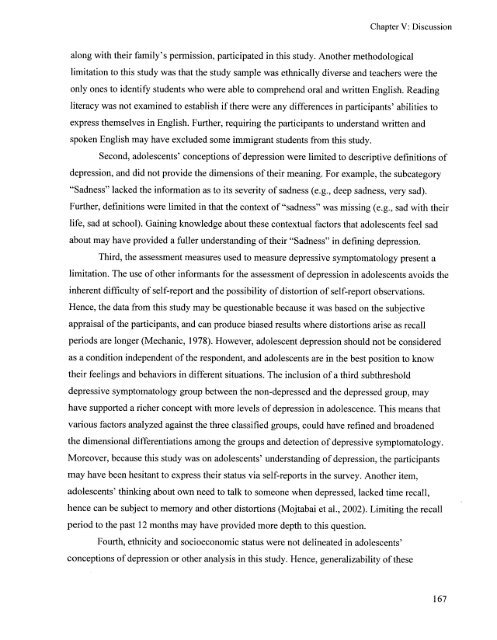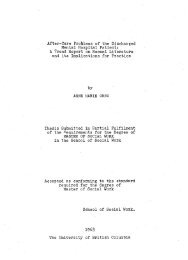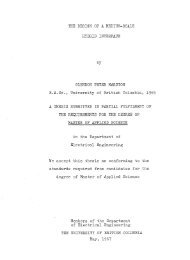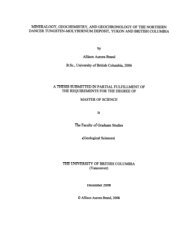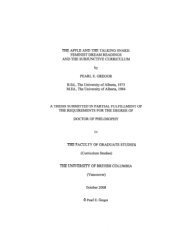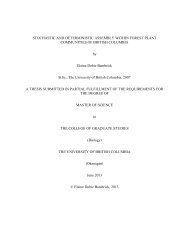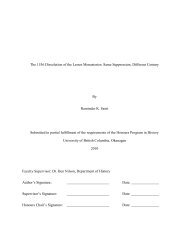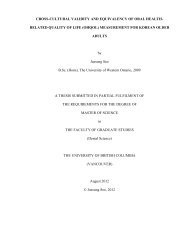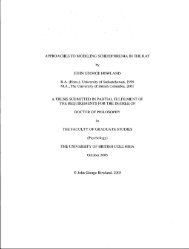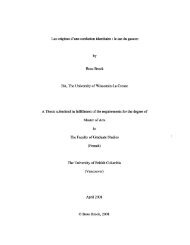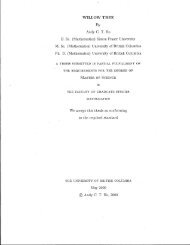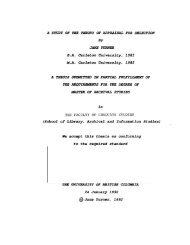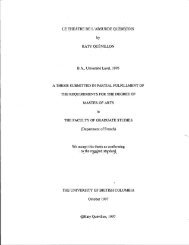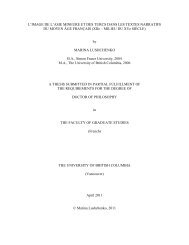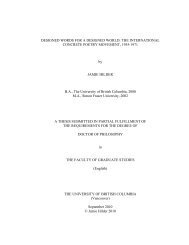how do adolescents define depression? - cIRcle - University of ...
how do adolescents define depression? - cIRcle - University of ...
how do adolescents define depression? - cIRcle - University of ...
You also want an ePaper? Increase the reach of your titles
YUMPU automatically turns print PDFs into web optimized ePapers that Google loves.
along with their family's permission, participated in this study. Another metho<strong>do</strong>logical<br />
Chapter V: Discussion<br />
limitation to this study was that the study sample was ethnically diverse and teachers were the<br />
only ones to identify students who were able to comprehend oral and written English. Reading<br />
literacy was not examined to establish if there were any differences in participants' abilities to<br />
express themselves in English. Further, requiring the participants to understand written and<br />
spoken English may have excluded some immigrant students from this study.<br />
Second, a<strong>do</strong>lescents' conceptions <strong>of</strong> <strong>depression</strong> were limited to descriptive definitions <strong>of</strong><br />
<strong>depression</strong>, and did not provide the dimensions <strong>of</strong> their meaning. For example, the subcategory<br />
"Sadness" lacked the information as to its severity <strong>of</strong> sadness (e.g., deep sadness, very sad).<br />
Further, definitions were limited in that the context <strong>of</strong> "sadness" was missing (e.g., sad with their<br />
life, sad at school). Gaining knowledge about these contextual factors that a<strong>do</strong>lescents feel sad<br />
about may have provided a fuller understanding <strong>of</strong> their "Sadness" in defining <strong>depression</strong>.<br />
Third, the assessment measures used to measure depressive symptomatology present a<br />
limitation. The use <strong>of</strong> other informants for the assessment <strong>of</strong> <strong>depression</strong> in a<strong>do</strong>lescents avoids the<br />
inherent difficulty <strong>of</strong> self-report and the possibility <strong>of</strong> distortion <strong>of</strong> self-report observations.<br />
Hence, the data from this study may be questionable because it was based on the subjective<br />
appraisal <strong>of</strong> the participants, and can produce biased results where distortions arise as recall<br />
periods are longer (Mechanic, 1978). However, a<strong>do</strong>lescent <strong>depression</strong> should not be considered<br />
as a condition independent <strong>of</strong> the respondent, and a<strong>do</strong>lescents are in the best position to know<br />
their feelings and behaviors in different situations. The inclusion <strong>of</strong> a third subthreshold<br />
depressive symptomatology group between the non-depressed and the depressed group, may<br />
have supported a richer concept with more levels <strong>of</strong> <strong>depression</strong> in a<strong>do</strong>lescence. This means that<br />
various factors analyzed against the three classified groups, could have refined and broadened<br />
the dimensional differentiations among the groups and detection <strong>of</strong> depressive symptomatology.<br />
Moreover, because this study was on a<strong>do</strong>lescents' understanding <strong>of</strong> <strong>depression</strong>, the participants<br />
may have been hesitant to express their status via self-reports in the survey. Another item,<br />
a<strong>do</strong>lescents' thinking about own need to talk to someone when depressed, lacked time recall,<br />
hence can be subject to memory and other distortions (Mojtabai et al., 2002). Limiting the recall<br />
period to the past 12 months may have provided more depth to this question.<br />
Fourth, ethnicity and socioeconomic status were not delineated in a<strong>do</strong>lescents'<br />
conceptions <strong>of</strong> <strong>depression</strong> or other analysis in this study. Hence, generalizability <strong>of</strong> these<br />
167


